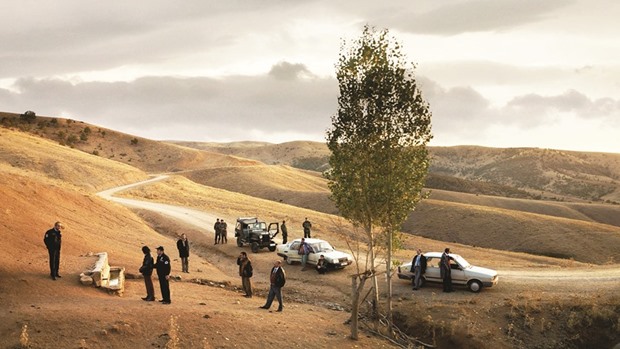Qumra, an old Arabic word for camera, is an initiative that connects with the top order of the global film-scape, so as to guide, support and inspire emerging filmmakers of the nation, and outside it, as well. From March 4 to March 9, acclaimed filmmakers will participate in a series of masterclasses, and one-on-one advisory sessions with participating Qumra projects and industry professionals from around the world.

A still from The Mourning Forest.
Meanwhile, a selection of the Masters’ films will be screened for Doha audiences during the event. The Qumra Screenings include the Modern Masters series – a showcase of films presented by the Qumra Masters, including Palme d’Or winner Nuri Bilge Ceylan, Caméra d’Or winner Naomi Kawase, Academy Award nominees Joshua Oppenheimer and James Schamus, and Golden Lion winner Aleksandr Sokurov. In addition, the New Voices in Cinema series highlights critically acclaimed, DFI-funded films. All screenings take place at the Museum of Islamic Art Auditorium, and the tickets are available on www.dohafilminstitute.com
“The primary motive of this international gathering of creative film professionals is to contribute to the development of emerging filmmakers, with a special focus on first-and second-time directors. Twenty-three feature-length and eleven short films at various stages of production have been selected to benefit from mentorship labs and business meetings with experts,” the DFI says, in a note on the event. Here, we take you through the schedule of the screenings:
On March 4, at 4pm, DFI Grants Programme recipient Jonas Carpignano presents his urgent and topical tale of two African migrants who make their way to Italy in the attempt to secure a better life for themselves, in Mediterranea. This will be preceded by the short film The Palm Tree that was made as part of the DFI’s Doc Lab, and won the Made in Qatar Award for Best Documentary at the Ajyal Youth Film Festival last year.
Later that day, at 7pm, Academy Award-winning producer, screenwriter and director James Schamus presents Academy Award-winning filmmaker Ang Lee’s masterful Crouching Tiger, Hidden Dragon (2001), that swept the Oscars and redefined martial-arts cinema for the new millennium.
Saturday begins with Roundabout in my Head, Algerian director Hassen Ferhani’s award-winning look at the lives of men working in the oldest slaughterhouse in Algiers, at 4pm. This will be preceded by the 15-minute-short film Waves ’98, a moving meditation on the contradiction of Beirutis who feel lost at home; it won the Palme d’Or at the Festival de Cannes, last year.
Later at 7pm, there’s Once Upon a Time in Anatolia by Palme d’Or winner Nuri Bilge Ceylan. Often cited as the Turkish director’s masterpiece, the film, a hypnotising medley of melancholy, mystery and the trials of life, is centred on a group of men who set out in search of a dead body in the Anatolian steppes.
On Sunday, catch Naomi Kawase’s The Mourning Forest, at 7pm. The youngest winner of the Caméra d’Or from Cannes, Kawase tells the story of a caregiver at a small retirement home who takes one of her patients for a drive to the country, and the two wind up stranded in a forest where they embark on an exhausting and enlightening two-day journey. Kawase’s intimate work is about tormented souls on a journey to peace.
Aleksandr Sokurov’s Russian Ark will be screened at 7pm on Monday. Celebrated as one of the finest filmmakers in world cinema, Sokurov presents his award-winning work, a celebration and critique of 300 years of Russian arts and culture.
Tuesday’s screening of Joshua Oppenheimer’s The Look of Silence, a hard-hitting documentary about the victims and perpetrators of the Indonesian Massacre of 1965 and 1966, is a private event. The film to be screened on Wednesday at 7pm will be announced later; hint: the film will be decided by popular demand.
“All films exhibited at Qumra are presented in their original, uncut versions. Unless otherwise noted, all films are shown in their original language with Arabic and English subtitles as necessary,” the DFI says.

